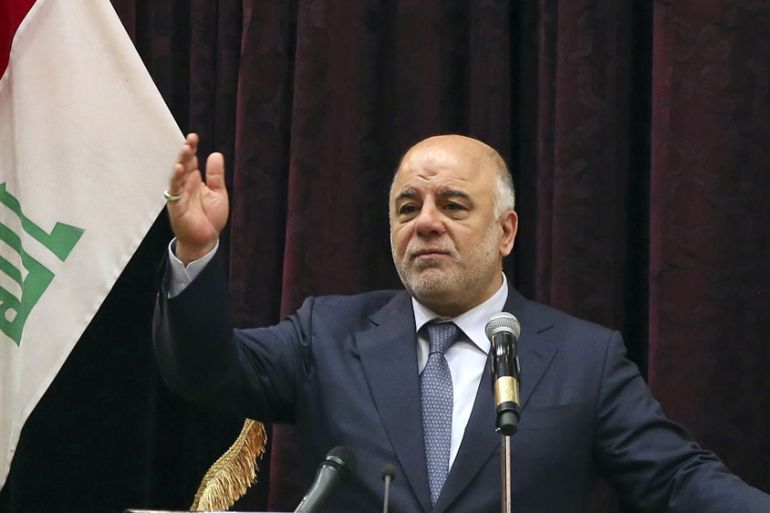What’s behind Abbadi’s visit to Tehran?
With Shia militias gaining ground in the fight against ISIL, Iran’s influence in Iraq is on the rise.

With little fanfare on Tuesday the Iraqi prime minister’s office announced to local media that the Commander-in-Chief of the Armed Forces, Haider al-Abbadi, would send the Popular Mobilisation Forces (PMF) to take part in the liberation of Iraq’s second largest city, Mosul.
No timetable for that anti-ISIL offensive has been given. But the timing of the announcement might be significant. Abbadi flew to Tehran on Wednesday for a day-long visit to meet with the leadership including, significantly, Supreme Leader Ayatollah Ali Khamenei.
Keep reading
list of 4 itemsWill 2018 be a year of change in Iraq?
Iraq’s parliament pushes back against PM over reforms
Iraq probe implicates Maliki over Mosul’s fall to ISIL
The use of the PMF has been controversial. They’re known locally as al-Hashd al-Shaabi and globally as Shia militias, although given that in recent weeks their ranks have swelled by Sunni fighting forces, it’s a term best shrunk to just militias.
However, the core of them remain Shia and within that the most effective fighting forces are backed and armed by Iran. That’s sure to be an issue discussed because Iran’s influence over some of the militias is a real sticking point for the PM.
Abbadi has wanted to exert complete control for months, even bringing the militias under his control in his role as commander-in-chief. He will be looking to seek reassurances from the Iranians that they will allow him to be in complete control of the armed forces.
Sajad Jiyad is a senior researcher at the think-tank al-Bayan. He says that Iranian influence is a concern for the Iraqi leader. “The most sensitive issue is Iran’s relationship with some of the groups in the PMF, which may undermine Abbadi’s authority, I think the prime minister is right to bring that up but can’t see much progress being made.”
But progress on that issue will be crucial as Abbadi is coming under immense pressure from within his own party.
In recent weeks former Prime Minister Nouri al-Maliki has reasserted himself on the domestic stage leading some to speculate over whether he is about to make a comeback. A strong relationship with Iran will help Abbadi to remain in control.
“Obviously Iran is heavily invested in the battle against ISIL …,” continues Jiyad, “so that’s probably the strongest part of the relationship at the moment, and the Iraqi government needs support”.
Bonded by faith
But beyond the war against ISIL, trade and economics will also be important. Iraq has long ignored the Western sanctions imposed on Iran and has maintained a lucrative relationship with the Islamic republic.
The whole relationship, however, is underpinned by religion. Both Shia-led governments are bonded by faith. But even here cracks are beginning to appear and once again Maliki might be behind those fissures.
Very quietly Maliki has supported the setting up of offices promoting the idea of a Wilayat al-Faqih here in Iraq. Translated into English it means guardian of the jurist – custodianship over people – in effect copying the Iranian system of a supreme leader.
Mohammed Jasim al-Dadhim is a professor at the Islamic jurisprudence college at Baghdad University.
“What the former leader is trying so hard to implement is the method of supreme leader,” says Dadhim.
“He has been planning this for a long time and it’s controversial. Because of this he is considered by many resentful Shia clerics as a puppet of Iran in Iraq. He is promoting Grand Ayatollah Mahmoud Hashimi Shahroudi to be the successor of Grand Ayatollah Sistani in case of the latter’s sudden death, a choice clearly preferred by Iran.”
This is an idea that has a lot of traction among religious figures in Iran but is met with hesitation here in Iraq.
“Grand Ayatollah Sistani, the highest Shia religious authority doesn’t believe in this method,” says Dadhim.
“He believes in a partial succession based on a candidate that is both trusted and revered among Shia clerics here in Iraq and there is a name that all agree on. Ayatollah Mohammed Saeed al-Hakim, who is currently in Najaf.”
But why would Iran want to shape the future religious offices of Iraq? Clues lie in the past relationship between Sistani and Iran.
Since ISIL took control of Iraqi territory he has issued statements critical of the Iranian role most notably defending Iraqi sovereignty and denying that he supports the role of the Iranian Quds force commander Qassem Soleimani, who travels to Iraq regularly to direct the fight against ISIL through the militias Iran controls.
So for Iran it’s about maintaining a strong sphere of influence. For Prime Minister Abbadi it’s about managing that influence so that he pushes forward with his own agenda.
Ultimately no one in Iraq wants to damage the relationship with Iran. Unlike the US, Iran is here to stay and as a neighbour it’s better to have it as a friend rather than a foe.
But within the relationship that Abbadi has with the US that might give him an advantage. He wants Iran and the US to develop a clearer non-direct relationship when it comes to fighting ISIL, according to experts.
The Americans, however, are backing the Iraq Security Forces and Sunni tribal fighters. That’s something that Iran has issues with and that might mean Abbadi has some leverage in managing the deep and complex Iran-Iraq relationship and the relationship with the Americans which is based around US self-interest. It’s leverage he will need.